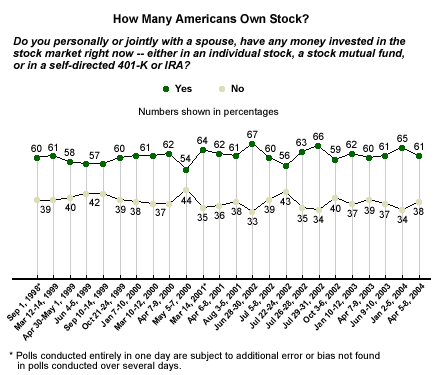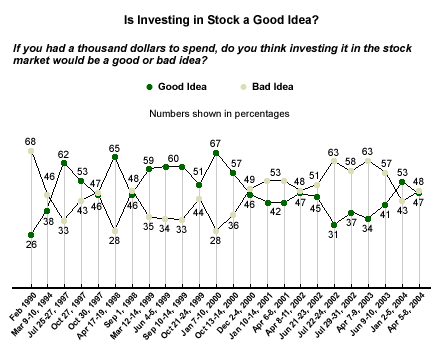During this time of economic uncertainty, Gallup's 2004 Economy and Personal Finance poll* provides some insight into the extent of stock ownership in the United States, and which Americans are most likely to own stock. The April poll indicates that 61% of Americans, either personally or jointly with a spouse, are invested in equities. The survey also reveals that if Americans had money to spend, 47% of them think it would be a good idea to invest in the stock market.
Who Owns Stock?
Given that there are approximately 105 million households in the United States (according to the last census), the poll numbers suggest that more than 64 million American households are invested in the stock market, either through individual stock, a mutual fund, or a self-directed 401(k) or IRA. Looking at the trend in stock ownership over the last five years, there have been a few modest fluctuations, but the percentage of investors has generally remained in the 60% range.

It is not surprising that Americans with higher incomes are most likely to report stock ownership. Those in households where the income is $75,000 or more (92%) are nearly three times more likely than those in households where the income is $30,000 or less (31%) to own stocks. Marriage also seems to go hand in hand with owning stock. While 76% of those who are married are stockowners, only 46% of unmarried Americans own stock in some form. This is partly because married couples tend to have more income than those who are not married, but married couples are still somewhat more likely to invest than unmarried people at similar income levels.
Opinion as a Contrarian Indicator
Public opinion on whether it is a good idea to invest in stocks is divided. When asked the question, "If you had a thousand dollars to spend, do you think investing it in the stock market would be a good or bad idea," 47% of respondents said that it is a good idea to invest in stocks at this point, while 48% think it is a bad idea.
In fact, public opinion on when it is a good time to invest makes for a reliable contrarian indicator of stock market performance ("contrarians" being investors who like to go against the prevailing wisdom in their investment strategies). Invariably, Americans become convinced that it is a good idea to invest in stocks when the equity market valuations are high. When the market is about to bottom out, we see the reverse -- Americans have overwhelmingly negative responses to the idea of investing in stocks. During January 2000, just when stock market valuations had reached bubble proportions, 67% of Americans thought it was a good idea to invest in stocks. In July 2002, as the market began to bottom out and poise itself for a bull run in 2003, sentiment was at its most negative -- a mere 31% of Americans thought it was a good idea to invest in stocks.

Bottom Line
Stock ownership has fluctuated only slightly over the last five years, even as public sentiment about the stock market has seen much volatility. It appears that investors have chosen to hold on to their equity positions, even as the economy contracted and their portfolios took a beating. The trend also reveals that public conviction in stock market prospects is experiencing a tentative rebound, compared to where it was in the summer of 2002 amid the wave of corporate scandal and lackluster market performance. At a time when the economy is firmly in recovery, but rates are poised to rise and post-election economic uncertainties loom before us, it is understandable that the consensus opinion is simply this: wait and watch.
*Results are based on telephone interviews with 1,014 national adults, aged 18 and older, conducted April 5-8, 2004. For results based on the total sample of national adults, one can say with 95% confidence that the margin of sampling error is ±3 percentage points.
